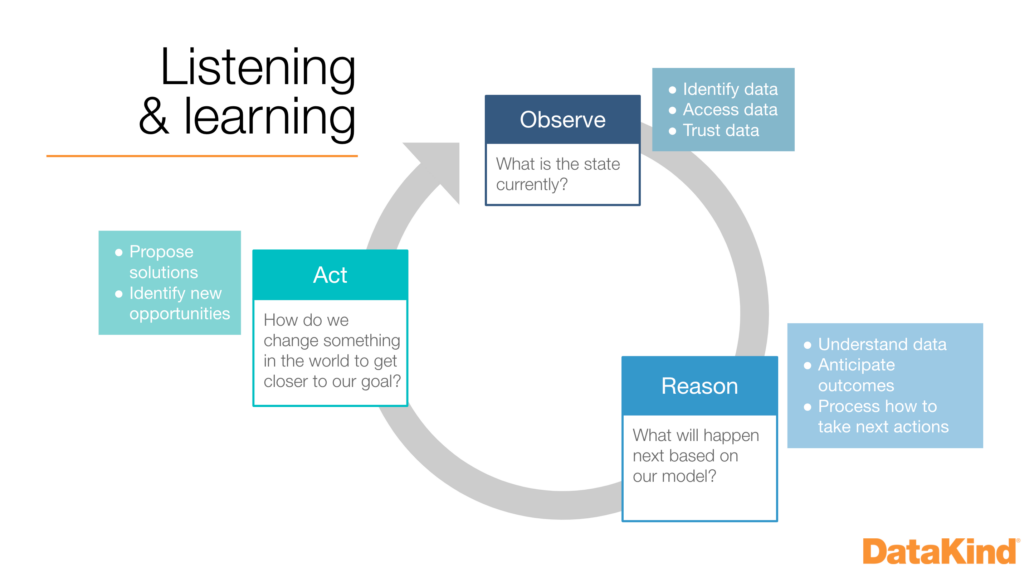By Rachel Wells, Senior Manager, Center of Excellence, DataKind
Last week, we announced the public release of DataKind’s Playbook and hope you’ve had a chance to explore it. Now, you might be wondering how we got here or want to co-create a Playbook for your community. This blog outlines what we did and what we learned from the co-creation process to build DataKind’s Playbook.
The co-creation process
DataKind’s Center of Excellence led the 18-month Playbook creation process. We started with a virtual design sprint for vision alignment which was planned and executed in April and May 2020. The design sprint included:
- Review of the existing internal playbooks: DataKind already had many resources and substantial process documentation that captured the learnings recorded throughout the first eight years of DataKind’s existence. These resources were gathered as a baseline to add to and get feedback on.
- Asynchronous reflection and design thinking exercises for volunteers and staff across the globe: These individual exercises included user profiles, content brain dumps, solution sketches, reflection on past resources, affinity mapping, and reflection questions with intentional equity and inclusion lenses.
- Group workshops: We hosted design sprints for each of our five Chapters, alumni, and staff to bring asynchronous activities together within groups that commonly work together. This helped the team to identify the takeaways and themes that their group wanted to prioritize when thinking about a Playbook for all of DataKind.
- Global design sprint conclusion and all group share-back: A representative from each of the groups shared the results of their sprint by answering, “What did your group come to agree on as the most important considerations for Playbook design?” The sprints identified common themes and responses across groups as well as a development plan based on the results.
- Volunteer recruitment: Naturally, capturing our volunteers’ expertise for the Playbook didn’t end with the design sprint! We recruited Excellence Ambassadors from the Chapters to help write articles and build the prototype for alpha release, to ensure it was truly a co-created resource across our global network.
After we designed the Playbook, with these insights in mind, we developed the first version in preparation for the alpha release in collaboration with volunteers and staff, conducting a deep review of existing resources and drafted Playbook materials in DataKind’s archives. We focused on bringing together established best practices and resources that we already had, pulling all materials and resources into one place and structure. We then took what was developed and began to iterate on it through continuous testing, evaluating, co-creating, and integrating updates over the course of an entire year which involved:
- Bi-weekly co-creation sessions with staff testing the resources to develop additional templates, add best practices, and refine recommendations based on ongoing experience and feedback
- Monthly Chapter check-ins and content contributions from across the global network, to ensure the Playbook is reflective of every different cultural context in which we work
- Constant iteration with over 20 articles changing each month
- Openly sharing unfinished content with volunteers for early stage feedback and testing as we developed new resources and content
- Two more releases with new structures based on feedback and additional content based on further co-creation and development
- Sharing the beta release openly with about 70 individuals in the broader community outside of DataKind, to get feedback from the Data Science and AI for Good ecosystem
- Regularly training volunteers on new processes and resources being tested, all the while requesting feedback and enabling live editing for volunteers in a variety of roles across the DataKind community
With a year of learning and improving, this brings us to the present: the public release. Of course, we’ll continue testing, tracking, evaluating, and integrating processes indefinitely. We’re excited to continue to improve and iterate based on what we hear from you, so let us know what you think!
Lessons learned in co-creating with a global community
Of course, the Playbook is our primary result, but with DataKind’s spirit of continuously sharing learnings, I would be remiss to not also mention our lessons learned through this experience of co-creating with a global network:
- Decide on your success metrics, outline a measurement approach, and systematize it.
- Adjust the co-creation process and the design of the Playbook for a variety of communication and learning styles.
- Be flexible and embrace cultural differences.
- Be transparent in the design and decision-making process.
- Take time to use change management strategies to support the end users being impacted across diverse communities.
- Allow for way more time than you think you need to test and refine quality standards.
- People > technology: Throughout our project process, what makes DataKind’s approach excellent is our involvement and prioritization of humans, rather than needing to use the most advanced technologies at all times.
Overall, to summarize, we’ve learned that the key to successful process improvement follows good design and co-creation practices. So we want again to say a huge thanks to all the amazing staff, volunteers, and partners who have been involved in this journey. We couldn’t have done it without you!

As the leader of the Center of Excellence, Rachel codifies processes, ensures all projects are executed with the highest quality standards, and creates structures to facilitate experimentation and sharing of learnings at DataKind.
If you want to see the social sector transformed, join us in advancing the use of data science and AI to support causes that can help make the world a better place.
- Interested in supporting our work? Donate here.
- Interested in sponsoring a project? Partner with us.
- Interested in volunteering with DataKind? Look no further.
- Interested in working at DataKind? Apply now!
- Interested in submitting a project? Go for it!
As always, thank you for your support of this critical work!



